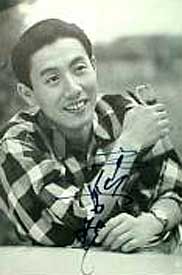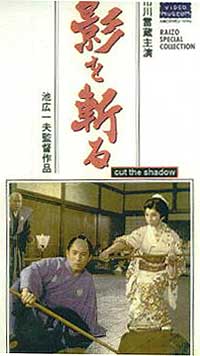Kageo kiro (Cut the Shadow, Daiei, 1962) is a samurai comedy more in the style of Toei Studio films than the usual Daiei product. It stars Raizo Ichikawa, who took his stage name from a classical kabuki actor, his own training having begun in the kabuki theater.
He plays womanizer Naando Ii, hereditary fencing master of a run-down dojo & minor retainer to a castle, hires unemployed samurai to make himself look good in front of the men he instructs. To earn one ryu, a tough, scruffy ronin makes Naando look good on the dojo floor, winning the instructor applause from tricked students.
 Instead of learning swordsmanship himself, Naando takes the castle's young lord carousing through the entertainment district. Naando's wise-cracking, laziness, & womanizing is scarsely offset by his good looks & cleverness in twisting anything people say to his own advantage. He is practically undone, however, when he falls in love with the daughter of a higher class samurai. Instead of learning swordsmanship himself, Naando takes the castle's young lord carousing through the entertainment district. Naando's wise-cracking, laziness, & womanizing is scarsely offset by his good looks & cleverness in twisting anything people say to his own advantage. He is practically undone, however, when he falls in love with the daughter of a higher class samurai.
Sada (Michiko Saga) is the naginata (halberd) instructor of castle women. On their wedding night she informs Naando that he must defeat her in a match before their marriage can be consumated. When he refuses & tries to take her by force, she uses jujitsu technique to heave him through a rice paper door.
Soonafter, she defeats him in a match in the dojo, & sends him off on a musho-shugyo or warrior pilgrammage to learn how to fence. Instead, he goes to Edo & womanizes some more, then returns to Kyoto for a rematch, & is defeated again.
Returning again to Edo, he again fails to study swordsmanship. He meets a geisha named Kimiryu who looks exactly like his country wife, & spends a lot of time trying to figure out if it is his wife playing a trick on him or an actual look-alike. Finally he gets into a position where his lack of fighting skill makes him seem unmanly, & Kimiryu shames him so badly that he sets out seriously on a one year pilgrimmage.
The high comedy of the film builds toward a perfectly serioius if rather misogynist ending. The castle's lord, henpecked by his upper class wife (daughter of the Shogun), has decided to retire form the world (i.e., become a monk) if the freedom-loving Naando becomes as shackled by Sada as the young lord is by his arrogant wife. What started out as "henpecking jokes" suddenly becomes a portrayal of villainy, the proud, powerful wife making a tragic mockery of the young lord's authority.
When Naando returns, he wins the third duel with his wife, & a weeping young lord hugs his victorious retainer & sobs, "How can a man live ruled by a woman?" His wife overhears this & is so ashamed of herself that she, too, bows thereafter to her husband's needs, going so far as to insist he slap her around.
The film is awfully good, having more human comedy than slapstick. But the ending's simpleminded misogyny leaves one wondering, is it truly essential that a strong woman become subjugated to the will of a man before he can feel manly? If Naando had lost the third duel, would he have committed suicide? If it had been a draw, would he still have felt humiliated to have a wife who was his equal? Did he lack sufficient character to be proud of his wife?
We'll never know, because a male filmmaker's wishfulness is all we get here -- the amazon defeated by the womanizer; the amazon happy to find someone strong enough to bring her down a peg.
All the same, along the way we've been treated to some nice images of naginata skills by women in feudal Japan. This is an historically valid image of castle women, & it's only unsettling that it takes a comedy for a filmmaker to show something as realistic as a whole dojo full of fighting women.
copyright © by Paghat the Ratgirl
|

 Instead of learning swordsmanship himself, Naando takes the castle's young lord carousing through the entertainment district. Naando's wise-cracking, laziness, & womanizing is scarsely offset by his good looks & cleverness in twisting anything people say to his own advantage. He is practically undone, however, when he falls in love with the daughter of a higher class samurai.
Instead of learning swordsmanship himself, Naando takes the castle's young lord carousing through the entertainment district. Naando's wise-cracking, laziness, & womanizing is scarsely offset by his good looks & cleverness in twisting anything people say to his own advantage. He is practically undone, however, when he falls in love with the daughter of a higher class samurai.